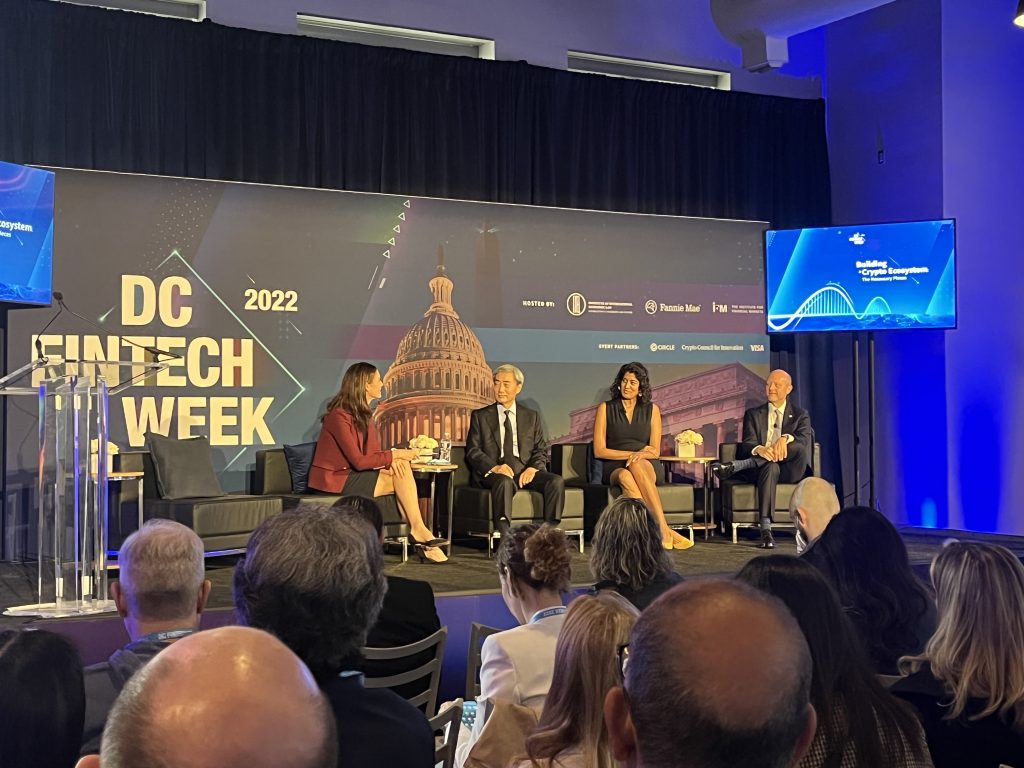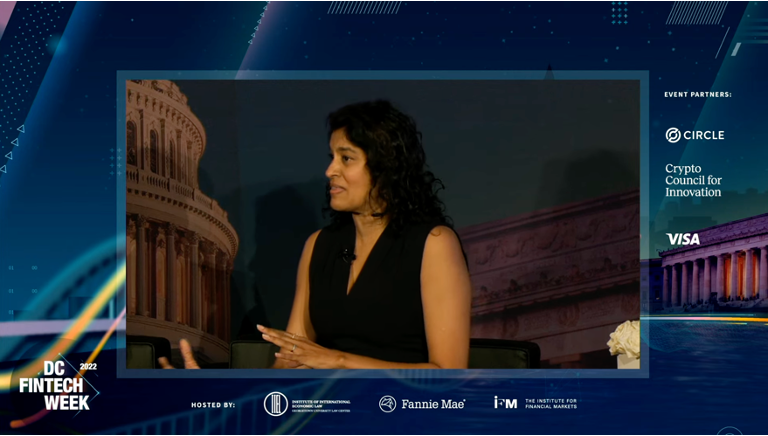
Summary:
- Crypto Council CEO Sheila Warren spoke during the 6th Annual DC Fintech Week alongside speakers from Circle, CNBC, and the Bank of International Settlements.
- Crypto is taking off, but regulatory clarity is needed to take advantage of the opportunity, speakers agreed.
- Questions around asset classification and privacy must be answered.
- Rewatch the livestream on YouTube.
What’s necessary to build a crypto ecosystem? Crypto Council CEO Sheila Warren answered this very question during a panel yesterday at the 6th Annual DC Fintech Week, which brought together regulators, VCs, economists, academics, and entrepreneurs.
Moderated by CNBC’s Kate Rooney, the spirited discussion also featured Jeremy Allaire, Co-Founder, Chairman & CEO of Circle, and Hyun Song Shin, Economic Adviser and Head of Research for the Bank of International Settlements.
We may be in the middle of a “crypto winter,” but there are a few things we can do to take advantage of the huge opportunity for crypto and consumers – here are three takeaways from the session.
1. Crypto’s ready for prime time – if we have regulatory clarity.
“The pace of innovation is unlike anything we’ve ever seen,” said CCI’s Sheila Warren. However, without a “comprehensive narrative” that speaks to consumers and users, we’re prone to “the hype cycle, to things being over talked about before they’re quite ready,” and prone to “FUD – fear, uncertainty, and doubt – and just misperception or misinformation about the industry.”
We need regulatory clarity – “rules of the road that are more consistent, or perhaps standardized,” she explained.
Regulatory clarity will help make crypto “accessible and usable at mass scale,” echoed Jeremy Allaire, Co-Founder, Chairman & CEO of Circle. “Getting that regulatory clarity is really key so that corporations, households, other financial institutions, understand how to use these tokenized cash instruments at scale.”

2. ‘Crypto is the key to both proving identity and preserving privacy’
“Who needs to have access to what and why?” asked Warren. “Why should we be giving centralized platforms access to a lot of private information? It’s not actually necessary.”
The financial system has disenfranchised a significant proportion of the world’s population, because they simply don’t have access to some of the identity markers that we deemed essential when there are, in fact, other identity markers that could be substituted in a meaningful way and in a safe way, Warren continued.
Case in point: “My daughter goes into a bar and has to give out her home address to get a drink,” said Circle’s Allaire. “Why can’t we have identity proofs that can prove things based on cryptographic proof? So, crypto is actually the key to both proving identity and preserving privacy.”
This is an area where regulation can help, too.
“There has to be public consultation, including on how to safeguard privacy,” noted Hyun Song Shin, Economic Adviser and Head of Research for the Bank of International Settlements, which he said represents 63 central banks around the world.
3. Asset classification matters.
We know we need regulation – and governments know it, too.
“In Europe, we’ve seen some stablecoin [legislation]” said Warren. “There’s stablecoin legislation that is bubbling up here in the United States that we all think is going to sometime next year really solidify and come to fruition.”
The U.S. stablecoin legislation “does a very good job of establishing what this new form of digital currency money is, and I think it’s the best shot that the United States has right now to compete in dollar digital currency and to compete rapidly on a global stage,” said Allaire.
“In most jurisdictions, you have some clarity around how to tax,” added Warren.
“But I think the biggest question that’s on everyone’s minds at the moment is asset classification,” she said. “How does our alphabet soup of agencies play in this space? And this isn’t necessarily settled anywhere else, either.”
The question of whether crypto is a security or commodity “is not yet settled in even industry minds, let alone in the minds of policymakers or regulators,” she concluded.
Did you miss it? You can rewatch the livestream on YouTube.

























